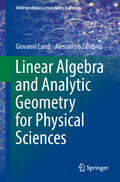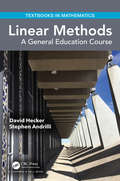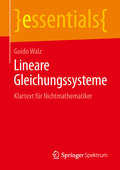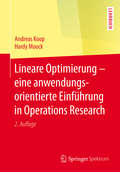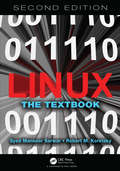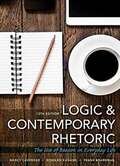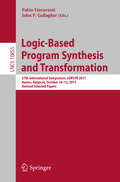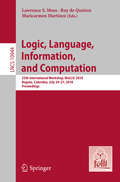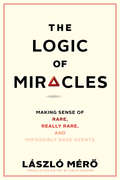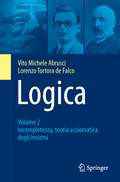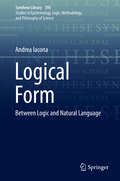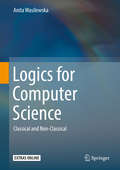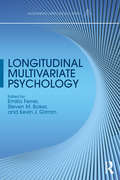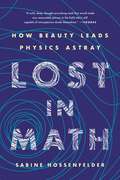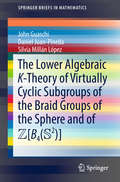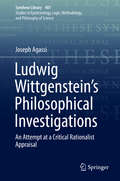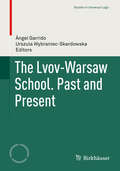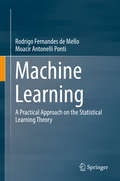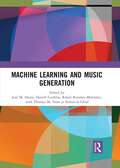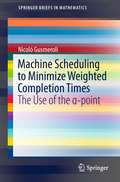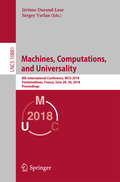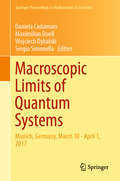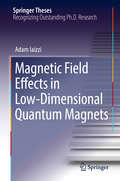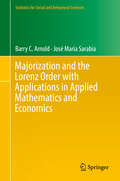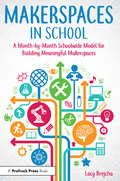- Table View
- List View
Linear Algebra and Analytic Geometry for Physical Sciences (Undergraduate Lecture Notes in Physics)
by Alessandro Zampini Giovanni LandiA self-contained introduction to finite dimensional vector spaces, matrices, systems of linear equations, spectral analysis on euclidean and hermitian spaces, affine euclidean geometry, quadratic forms and conic sections. The mathematical formalism is motivated and introduced by problems from physics, notably mechanics (including celestial) and electro-magnetism, with more than two hundreds examples and solved exercises.Topics include: The group of orthogonal transformations on euclidean spaces, in particular rotations, with Euler angles and angular velocity. The rigid body with its inertia matrix. The unitary group. Lie algebras and exponential map. The Dirac’s bra-ket formalism. Spectral theory for self-adjoint endomorphisms on euclidean and hermitian spaces. The Minkowski spacetime from special relativity and the Maxwell equations. Conic sections with the use of eccentricity and Keplerian motions. An appendix collects basic algebraic notions like group, ring and field; and complex numbers and integers modulo a prime number.The book will be useful to students taking a physics or engineer degree for a basic education as well as for students who wish to be competent in the subject and who may want to pursue a post-graduate qualification.
Linear Methods: A General Education Course (Textbooks in Mathematics)
by David Hecker Stephen AndrilliLinear Methods: A General Education Course is expressly written for non-mathematical students, particularly freshmen taking a required core mathematics course. Rather than covering a hodgepodge of different topics as is typical for a core mathematics course, this text encourages students to explore one particular branch of mathematics, elementary linear algebra, in some depth. The material is presented in an accessible manner, as opposed to a traditional overly rigorous approach. While introducing students to useful topics in linear algebra, the book also includes a gentle introduction to more abstract facets of the subject. Many relevant uses of linear algebra in today’s world are illustrated, including applications involving business, economics, elementary graph theory, Markov chains, linear regression and least-squares polynomials, geometric transformations, and elementary physics. The authors have included proofs of various important elementary theorems and properties which provide readers with the reasoning behind these results. Features: Written for a general education core course in introductory mathematics Introduces elementary linear algebra concepts to non-mathematics majors Provides an informal introduction to elementary proofs involving matrices and vectors Includes useful applications from linear algebra related to business, graph theory, regression, and elementary physics Authors Bio: David Hecker is a Professor of Mathematics at Saint Joseph's University in Philadelphia. He received his Ph.D. from Rutgers University and has published several journal articles. He also co-authored several editions of Elementary Linear Algebra with Stephen Andrilli. Stephen Andrilli is a Professor in the Mathematics and Computer Science Department at La Salle University in Philadelphia. He received his Ph.D. from Rutgers University and also co-authored several editions of Elementary Linear Algebra with David Hecker.
Lineare Gleichungssysteme: Klartext für Nichtmathematiker (essentials)
by Guido WalzDieses Buch vermittelt in leicht verständlicher Sprache Techniken zum Lösen linearer Gleichungssysteme. Der Fokus liegt dabei auf dem Gauß-Verfahren, da man hiermit Systeme beliebiger Größe und Form vollständig lösen kann. Die ersten beiden Kapitel sind der Behandlung quadratischer Systeme mit zwei oder drei Unbekannten gewidmet, um dem Leser die prinzipielle Vorgehensweise zu schildern. Darauf aufbauend wird das Gauß-Verfahren für Systeme beliebiger Größe – quadratische und nicht-quadratische – geschildert und anhand zahlreicher Beispiele illustriert. Der Darstellung der Lösungsmenge von Systemen mit unendlich vielen Lösungen ist ein eigener Abschnitt gewidmet. Weiterhin werden Strategien zur Behandlung von Textaufgaben, die auf lineare Gleichungssysteme führen, aufgezeigt.
Lineare Optimierung – eine anwendungsorientierte Einführung in Operations Research
by Andreas Koop Hardy MoockLeicht verständlich und praxisorientiert behandelt das vorliegende Buch die wesentlichsten Gebiete der Linearen Optimierung, einem Kernbereich des Operations Research. Es wendet sich an Studierende betriebswirtschaftlicher und technischer Disziplinen. Aber auch der Praktiker aus kleinen und mittelständischen Unternehmen wird in hohem Maße davon profitieren. Da kaum mathematische Kenntnisse vorausgesetzt werden, fällt es gerade ihm leicht, sich selbstständig in die Lineare Programmierung einzuarbeiten, die erhebliche Kostensenkungen und Zeiteinsparungen ermöglicht. Auch Studierende der Mathematik und der Informatik werden durch das Buch angesprochen, da sie sehr schnell einen Überblick über die Lineare Programmierung gewinnen können. Kurz und prägnant, dabei vollständig und mathematisch exakt, werden die Methoden hergeleitet, rezeptartig zusammengefasst, durch zahlreiche Beispiele und Übungsaufgaben ergänzt und mit zwei Fallstudien aus der betriebswirtschaftlichen und technischen Praxis angereichert. Nicht zu vergessen die softwaretechnische Umsetzung der Linearen Programme mittels Excel-Solver bzw. der Programmiersprache C. Dieses Buch ist ein Muss für jeden, der in die Thematik der Linearen Optimierung einsteigen möchte.
Linux: The Textbook, Second Edition
by Syed Mansoor Sarwar Robert M KoretskyLinux: The Textbook, Second Edition provides comprehensive coverage of the contemporary use of the Linux operating system for every level of student or practitioner, from beginners to advanced users. The text clearly illustrates system-specific commands and features using Debian-family Debian, Ubuntu, and Linux Mint, and RHEL-family CentOS, and stresses universal commands and features that are critical to all Linux distributions. The second edition of the book includes extensive updates and new chapters on system administration for desktop, stand-alone PCs, and server-class computers; API for system programming, including thread programming with pthreads; virtualization methodologies; and an extensive tutorial on systemd service management. Brand new online content on the CRC Press website includes an instructor’s workbook, test bank, and In-Chapter exercise solutions, as well as full downloadable chapters on Python Version 3.5 programming, ZFS, TC shell programming, advanced system programming, and more. An author-hosted GitHub website also features updates, further references, and errata. Features New or updated coverage of file system, sorting, regular expressions, directory and file searching, file compression and encryption, shell scripting, system programming, client-server–based network programming, thread programming with pthreads, and system administration Extensive in-text pedagogy, including chapter objectives, student projects, and basic and advanced student exercises for every chapter Expansive electronic downloads offer advanced content on Python, ZFS, TC shell scripting, advanced system programming, internetworking with Linux TCP/IP, and many more topics, all featured on the CRC Press website Downloadable test bank, work book, and solutions available for instructors on the CRC Press website Author-maintained GitHub repository provides other resources, such as live links to further references, updates, and errata
Logic And Contemporary Rhetoric: The Use Of Reason In Everyday Life (Mindtap Course List Ser.)
by Frank Boardman Nancy M. Cavender Howard KahaneLOGIC AND CONTEMPORARY RHETORIC: THE USE OF REASON IN EVERYDAY LIFE, 13th Edition, introduces you to sound reasoning using current, relevant, and stimulating examples in a witty and invigorating writing style. Combining examples from television, newspapers, magazines, advertisements, and our nation's political dialogue, this classic text brings the concepts to life and puts critical-thinking skills into a context that you will retain and use throughout your life.
Logic-Based Program Synthesis and Transformation: 27th International Symposium, LOPSTR 2017, Namur, Belgium, October 10-12, 2017, Revised Selected Papers (Lecture Notes in Computer Science #10855)
by Fabio Fioravanti John P. GallagherThis book constitutes the thoroughly refereed post-conference proceedings of the 27th International Symposium on Logic-Based Program Synthesis and Transformation, LOPSTR 2017, held in Namur, Belgium, in October 2017. The 19 revised full papers were carefully reviewed and selected from 29 submissions. In addition to the 19 revised papers, this volume includes the abstracts of the invited talks by three outstanding speakers: Sumit Gulwani, Marieke Huisman, and Grigore Roşu. The aim of the LOPSTR series is to stimulate and promote international research and collaboration on logic-based program development. LOPSTR is open to contributions in all aspects of logic-based program development, all stages of the software life cycle, and issues of both programming-in-the-small and programming-in-the-large. LOPSTR traditionally solicits contributions, in any language paradigm, in the areas of synthesis, specification, transformation, analysis and verification, specialization, testing and certification, composition, program/model manipulation, optimization, transformational techniques in SE, inversion, applications, and tools.
Logic, Language, Information, and Computation: 25th International Workshop, WoLLIC 2018, Bogota, Colombia, July 24-27, 2018, Proceedings (Lecture Notes in Computer Science #10944)
by Lawrence S. Moss Ruy De Queiroz Maricarmen MartinezEdited in collaboration with FoLLI, the Association of Logic, Language and Information this book constitutes the refereed proceedings of the 25th Workshop on Logic, Language, Information and Communication, WoLLIC 2018, held inBogota, Colombia, in July 2018. The 16 full papers together with 3 short papers and 3 invited talks presented were fully reviewed and selected from 30 submissions. The vision for the conference is to provide an annual forum which is large enough to provide meaningful interactions between logic and the sciences related to information and computation.
Logic of Miracles: Making Sense of Rare, Really Rare, and Impossibly Rare Events
by Laszlo Mero Márton Moldován David KramerWe live in a much more turbulent world than we like to think, but the science we use to analyze economic, financial, and statistical events mostly disregards the world’s essentially chaotic nature. We need to get used to the idea that wildly improbable events are actually part of the natural order. The renowned Hungarian mathematician and psychologist László Méro explains how the wild and mild worlds (which he names Wildovia and Mildovia) coexist, and that different laws apply to each. Even if we live in an ultimately wild universe, he argues, we’re better off pretending that it obeys Mildovian laws. Doing so may amount to a self†‘fulfilling prophecy and create an island of predictability in a very rough sea. Perched on the ragged border between economics and complexity theory, Méro proposes to extend the reach of science to subjects previously considered outside its grasp: the unpredictable, unrepeatable, highly improbable events we commonly call “miracles.”
Logica: Volume 2 - Incompletezza, teoria assiomatica degli insiemi (UNITEXT #111)
by Vito Michele Abrusci Lorenzo Tortora de FalcoL'opera si propone come testo di riferimento per acquisire una solida preparazione specialistica nella Logica, presentando in maniera rigorosa ed innovativa argomenti tradizionalmente affrontati nei corsi universitari di secondo livello. Questo secondo volume, che completa l'opera, presenta le basi della teoria della ricorsività, l'aritmetica di Peano ed i teoremi di incompletezza, gli assiomi della teoria assiomatica degli insiemi di Zermelo-Fraenkel e la teoria degli ordinali e dei cardinali che ne deriva.
Logical Form: Between Logic and Natural Language (Synthese Library #393)
by Andrea IaconaLogical form has always been a prime concern for philosophers belonging to the analytic tradition. For at least one century, the study of logical form has been widely adopted as a method of investigation, relying on its capacity to reveal the structure of thoughts or the constitution of facts. This book focuses on the very idea of logical form, which is directly relevant to any principled reflection on that method. Its central thesis is that there is no such thing as a correct answer to the question of what is logical form: two significantly different notions of logical form are needed to fulfill two major theoretical roles that pertain respectively to logic and to semantics. This thesis has a negative and a positive side. The negative side is that a deeply rooted presumption about logical form turns out to be overly optimistic: there is no unique notion of logical form that can play both roles. The positive side is that the distinction between two notions of logical form, once properly spelled out, sheds light on some fundamental issues concerning the relation between logic and language.
Logics for Computer Science: Classical And Non-classical
by Anita WasilewskaProviding an in-depth introduction to fundamental classical and non-classical logics, this textbook offers a comprehensive survey of logics for computer scientists. Logics for Computer Science contains intuitive introductory chapters explaining the need for logical investigations, motivations for different types of logics and some of their history. They are followed by strict formal approach chapters. All chapters contain many detailed examples explaining each of the introduced notions and definitions, well chosen sets of exercises with carefully written solutions, and sets of homework. While many logic books are available, they were written by logicians for logicians, not for computer scientists. They usually choose one particular way of presenting the material and use a specialized language. Logics for Computer Science discusses Gentzen as well as Hilbert formalizations, first order theories, the Hilbert Program, Godel's first and second incompleteness theorems and their proofs. It also introduces and discusses some many valued logics, modal logics and introduces algebraic models for classical, intuitionistic, and modal S4 and S5 logics.The theory of computation is based on concepts defined by logicians and mathematicians. Logic plays a fundamental role in computer science, and this book explains the basic theorems, as well as different techniques of proving them in classical and some non-classical logics. Important applications derived from concepts of logic for computer technology include Artificial Intelligence and Software Engineering. In addition to Computer Science, this book may also find an audience in mathematics and philosophy courses, and some of the chapters are also useful for a course in Artificial Intelligence.
Longitudinal Multivariate Psychology (Multivariate Applications Series)
by Emilio Ferrer Steven M. Boker Kevin J. GrimmThis volume presents a collection of chapters focused on the study of multivariate change. As people develop and change, multivariate measurement of that change and analysis of those measures can illuminate the regularities in the trajectories of individual development, as well as time-dependent changes in population averages. As longitudinal data have recently become much more prevalent in psychology and the social sciences, models of change have become increasingly important. This collection focuses on methodological, statistical, and modeling aspects of multivariate change and applications of longitudinal models to the study of psychological processes. The volume is divided into three major sections: Extension of latent change models, Measurement and testing issues in longitudinal modeling, and Novel applications of multivariate longitudinal methodology. It is intended for advanced students and researchers interested in learning about state-of-the-art techniques for longitudinal data analysis, as well as understanding the history and development of such techniques.
Lost in Math: How Beauty Leads Physics Astray
by Sabine HossenfelderA contrarian argues that modern physicists' obsession with beauty has given us wonderful math but bad science Whether pondering black holes or predicting discoveries at CERN, physicists believe the best theories are beautiful, natural, and elegant, and this standard separates popular theories from disposable ones. This is why, Sabine Hossenfelder argues, we have not seen a major breakthrough in the foundations of physics for more than four decades. The belief in beauty has become so dogmatic that it now conflicts with scientific objectivity: observation has been unable to confirm mindboggling theories, like supersymmetry or grand unification, invented by physicists based on aesthetic criteria. Worse, these "too good to not be true" theories are actually untestable and they have left the field in a cul-de-sac. To escape, physicists must rethink their methods. Only by embracing reality as it is can science discover the truth.
The Lower Algebraic K-Theory of Virtually Cyclic Subgroups of the Braid Groups of the Sphere and of ZB4(S2)
by John Guaschi Daniel Juan-Pineda Silvia Millán LópezThis volume deals with the K-theoretical aspects of the group rings of braid groups of the 2-sphere. The lower algebraic K-theory of the finite subgroups of these groups up to eleven strings is computed using a wide variety of tools. Many of the techniques extend to the general case, and the results reveal new K-theoretical phenomena with respect to the previous study of other families of groups. The second part of the manuscript focusses on the case of the 4-string braid group of the 2-sphere, which is shown to be hyperbolic in the sense of Gromov. This permits the computation of the infinite maximal virtually cyclic subgroups of this group and their conjugacy classes, and applying the fact that this group satisfies the Fibred Isomorphism Conjecture of Farrell and Jones, leads to an explicit calculation of its lower K-theory. Researchers and graduate students working in K-theory and surface braid groups will constitute the primary audience of the manuscript, particularly those interested in the Fibred Isomorphism Conjecture, and the computation of Nil groups and the lower algebraic K-groups of group rings. The manuscript will also provide a useful resource to researchers who wish to learn the techniques needed to calculate lower algebraic K-groups, and the bibliography brings together a large number of references in this respect.
Ludwig Wittgenstein’s Philosophical Investigations: An Attempt at a Critical Rationalist Appraisal (Synthese Library #401)
by Joseph AgassiThis book collects 13 papers that explore Wittgenstein's philosophy throughout the different stages of his career. The author writes from the viewpoint of critical rationalism. The tone of his analysis is friendly and appreciative yet critical. Of these papers, seven are on the background to the philosophy of Wittgenstein. Five papers examine different aspects of it: one on the philosophy of young Wittgenstein, one on his transitional period, and the final three on the philosophy of mature Wittgenstein, chiefly his Philosophical Investigations. The last of these papers, which serves as the concluding chapter, concerns the analytical school of philosophy that grew chiefly under its influence. Wittgenstein’s posthumous Philosophical Investigations ignores formal languages while retaining the view of metaphysics as meaningless -- declaring that all languages are metaphysics-free. It was very popular in the middle of the twentieth century. Now it is passé. Wittgenstein had hoped to dissolve all philosophical disputes, yet he generated a new kind of dispute. His claim to have improved the philosophy of life is awkward just because he prevented philosophical discussion from the ability to achieve that: he cut the branch on which he was sitting. This, according to the author, is the most serious critique of Wittgenstein.
The Lvov-Warsaw School. Past and Present (Studies in Universal Logic)
by Ángel Garrido Urszula Wybraniec-SkardowskaThis is a collection of new investigations and discoveries on the history of a great tradition, the Lvov-Warsaw School of logic and mathematics, by the best specialists from all over the world. The papers range from historical considerations to new philosophical, logical and mathematical developments of this impressive School, including applications to Computer Science, Mathematics, Metalogic, Scientific and Analytic Philosophy, Theory of Models and Linguistics.
Machine Learning: A Practical Approach on the Statistical Learning Theory
by Rodrigo Fernandes de Mello Moacir Antonelli PontiThis book presents the Statistical Learning Theory in a detailed and easy to understand way, by using practical examples, algorithms and source codes. It can be used as a textbook in graduation or undergraduation courses, for self-learners, or as reference with respect to the main theoretical concepts of Machine Learning. Fundamental concepts of Linear Algebra and Optimization applied to Machine Learning are provided, as well as source codes in R, making the book as self-contained as possible.It starts with an introduction to Machine Learning concepts and algorithms such as the Perceptron, Multilayer Perceptron and the Distance-Weighted Nearest Neighbors with examples, in order to provide the necessary foundation so the reader is able to understand the Bias-Variance Dilemma, which is the central point of the Statistical Learning Theory.Afterwards, we introduce all assumptions and formalize the Statistical Learning Theory, allowing the practical study of different classification algorithms. Then, we proceed with concentration inequalities until arriving to the Generalization and the Large-Margin bounds, providing the main motivations for the Support Vector Machines. From that, we introduce all necessary optimization concepts related to the implementation of Support Vector Machines. To provide a next stage of development, the book finishes with a discussion on SVM kernels as a way and motivation to study data spaces and improve classification results.
Machine Learning and Music Generation
by José M. Iñesta, Darrell Conklin, Rafael Ramírez-Melendez, with Thomas M. Fiore as Editor-in-ChiefComputational approaches to music composition and style imitation have engaged musicians, music scholars, and computer scientists since the early days of computing. Music generation research has generally employed one of two strategies: knowledge-based methods that model style through explicitly formalized rules, and data mining methods that apply machine learning to induce statistical models of musical style. The five chapters in this book illustrate the range of tasks and design choices in current music generation research applying machine learning techniques and highlighting recurring research issues such as training data, music representation, candidate generation, and evaluation. The contributions focus on different aspects of modeling and generating music, including melody, chord sequences, ornamentation, and dynamics. Models are induced from audio data or symbolic data. This book was originally published as a special issue of the Journal of Mathematics and Music.
Machine Scheduling to Minimize Weighted Completion Times
by Nicoló GusmeroliThis work reviews the most important results regarding the use of the α-point in Scheduling Theory. It provides a number of different LP-relaxations for scheduling problems and seeks to explain their polyhedral consequences. It also explains the concept of the α-point and how the conversion algorithm works, pointing out the relations to the sum of the weighted completion times. Lastly, the book explores the latest techniques used for many scheduling problems with different constraints, such as release dates, precedences, and parallel machines. This reference book is intended for advanced undergraduate and postgraduate students who are interested in scheduling theory. It is also inspiring for researchers wanting to learn about sophisticated techniques and open problems of the field.
Machines, Computations, and Universality: 8th International Conference, MCU 2018, Fontainebleau, France, June 28–30, 2018, Proceedings (Lecture Notes in Computer Science #10881)
by Jérôme Durand-Lose Sergey VerlanThis book constitutes the refereed proceedings of the 8th International Conference on Machines, Computations, and Universality, MCU 2018, held in Fontainebleau, France, in June 2018. The 9 revised full papers presented together with 5 invited talks were carefully reviewed and selected from numerous submissions. MCU explores computation in the setting of various discrete models (Turing machines, register machines, cellular automata, tile assembly systems, rewriting systems, molecular computing models, neural models, concurrent systems, etc.) and analog and hybrid models (BSS machines, infinite time cellular automata, real machines, quantum computing, etc.).
Macroscopic Limits of Quantum Systems: Munich, Germany, March 30 - April 1 2017 (Springer Proceedings in Mathematics & Statistics #270)
by Daniela Cadamuro Maximilian Duell Wojciech Dybalski Sergio SimonellaBased on the workshop of the same name, this proceedings volume presents selected research investigating the mathematics of collective phenomena emerging from quantum theory at observable scales. Featured contributions from leading scientists provide a thorough overview of current and active research. Methods from functional analysis, spectral theory, renormalization group theory, and variational calculus are used to prove rigorous results in quantum physics. Topics include superconductivity and mathematical aspects of the BCS theory, the Jellium model and Bose-Einstein condensation, among others. Presenting technical details in an accessible way, this book serves as an introduction to research for advanced graduate students and is suitable for specialists in mathematical physics.The workshop “Macroscopic Limits of Quantum Systems” was held over three days in the spring of 2017 at the Technical University of Munich. The conference celebrated the achievements of Herbert Spohn and his reception of the Max Planck Medal.
Magnetic Field Effects in Low-Dimensional Quantum Magnets (Springer Theses)
by Adam IaizziThis thesis is a tour-de-force combination of analytic and computational results clarifying and resolving important questions about the nature of quantum phase transitions in one- and two-dimensional magnetic systems. The author presents a comprehensive study of a low-dimensional spin-half quantum antiferromagnet (the J-Q model) in the presence of a magnetic field in both one and two dimensions, demonstrating the causes of metamagnetism in such systems and providing direct evidence of fractionalized excitations near the deconfined quantum critical point. In addition to describing significant new research results, this thesis also provides the non-expert with a clear understanding of the nature and importance of computational physics and its role in condensed matter physics as well as the nature of phase transitions, both classical and quantum. It also contains an elegant and detailed but accessible summary of the methods used in the thesis—exact diagonalization, Monte Carlo, quantum Monte Carlo and the stochastic series expansion—that will serve as a valuable pedagogical introduction to students beginning in this field.
Majorization and the Lorenz Order with Applications in Applied Mathematics and Economics (Statistics For Social And Behavioral Sciences Ser.)
by Barry C. Arnold Jose Maria SarabiaThis book was written to serve as a graduate-level textbook for special topics classes in mathematics, statistics, and economics, to introduce these topics to other researchers, and for use in short courses. It is an introduction to the theory of majorization and related notions, and contains detailed material on economic applications of majorization and the Lorenz order, investigating the theoretical aspects of these two interrelated orderings. Revising and expanding on an earlier monograph, Majorization and the Lorenz Order: A Brief Introduction, the authors provide a straightforward development and explanation of majorization concepts, addressing historical development of the topics, and providing up-to-date coverage of families of Lorenz curves. The exposition of multivariate Lorenz orderings sets it apart from existing treatments of these topics.Mathematicians, theoretical statisticians, economists, and other social scientists who already recognize the utility of the Lorenz order in income inequality contexts and arenas will find the book useful for its sound development of relevant concepts rigorously linked to both the majorization literature and the even more extensive body of research on economic applications. Barry C. Arnold, PhD, is Distinguished Professor in the Statistics Department at the University of California, Riverside. He is a Fellow of the American Statistical Society, the American Association for the Advancement of Science, and the Institute of Mathematical Statistics, and is an elected member of the International Statistical Institute. He is the author of more than two hundred publications and eight books.José María Sarabia, PhD, is Statistics Professor in the Department of Economics at the University of Cantabria, Spain. He is author of more than one hundred publications and ten books and is an associate editor of several journals, including Journal of Banking and Finance, TEST, and Journal of Statistical Distributions and Applications.
Makerspaces in School: A Month-by-Month Schoolwide Model for Building Meaningful Makerspaces
by Lacy BrejchaOrganized into an easy-to-follow, month-by-month plan for implementation, this book provides field-tested and research-based knowledge that will serve educators as they create and maintain a meaningful Makerspace. Although science, technology, engineering, arts, and math have made huge gains in the past decade, STEAM jobs are not being filled at the rate they are being created or needed. Makerspaces in School promotes innovative thinking in students that fills this need. Through Makerspaces, project-based learning provides opportunities for credible, legitimate, and authentic growth and development. This book will allow any educator to walk away with a plan to create a Makerspace in his or her classroom or a school- or districtwide model that works for many. Makerspaces are very fluid places—each is unique in its own way!2020 Teachers' Choice Award for Professional Development Winner
